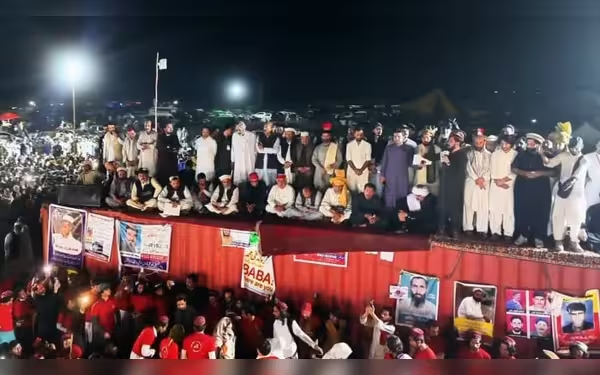Saturday, November 16, 2024 07:34 PM
Pashtun Qaumi Jirga Proposes Unarmed Lashkar for Community Defense
- Pashtun Milli Lashkar aims to protect local communities.
- Manzoor Pashteen emphasizes education for Afghan women.
- Jirga addresses extortion and trade restrictions.
 Image Credits: geo
Image Credits: geoThe Pashtun Qaumi Jirga proposes an unarmed Lashkar to protect communities and emphasizes education and local resource management.
PESHAWAR: In a significant development for the Pashtun community, the Pakhtun Qaumi Jirga convened recently and proposed the establishment of a "Pashtun Milli Lashkar." This initiative aims to create an unarmed force dedicated to safeguarding Pashtun communities across the region. The idea is to form a local defense mechanism that would involve 3,000 youth from each district and political party, as suggested during the three-day jirga.
Manzoor Pashteen, the chief of the Pashtun Tahaffuz Movement (PTM), announced this proposal at the closing session of the jirga. He emphasized the need for a committee that would oversee the extraction of resources throughout the Pashtun belt, which stretches from Quetta to Kohistan and Chitral. Pashteen highlighted that the committee's primary responsibility would be to ensure that local resources are utilized for the benefit of the Pashtun people, preventing any extraction that does not directly support the community.
In addition to addressing local issues, Pashteen also spoke about the situation in Afghanistan. He urged the Taliban-led government to lift the ban on girls attending school, stating, "The Afghan government must allow women to receive education." He underscored the importance of education in empowering future generations, a sentiment that resonates deeply within the community.
The jirga also tackled the pressing issue of extortion. Pashteen assured attendees that no Pashtun would be coerced into paying extortion money. He declared, "If any individual is threatened, the entire jirga will stand behind him," emphasizing the importance of collective action against such coercion.
Furthermore, Pashteen called for the removal of unnecessary trade restrictions at key border points, including Torkham, Nawapass, Chaman, and Angoor Adda. He demanded that Pashtuns be allowed to trade freely without facing obstacles that hinder their economic activities.
As the jirga concluded, there was a strong commitment to compile and formalize the proposals discussed, marking a pivotal moment in the ongoing struggle for Pashtun rights and autonomy. While various political figures attended the event, they chose to engage with attendees in smaller groups rather than addressing the jirga as a whole. Notably, Mushtaq Ahmad Khan from Jamaat-e-Islami addressed the gathering, declaring that the jirga would now serve as the primary decision-making body for Pashtun matters.
This initiative reflects a growing desire among the Pashtun community to assert their rights and ensure their voices are heard. The establishment of the "Pashtun Milli Lashkar" could potentially empower local youth and foster a sense of unity and strength within the community. As discussions continue, it remains to be seen how these proposals will be implemented and what impact they will have on the future of Pashtun rights and autonomy.













